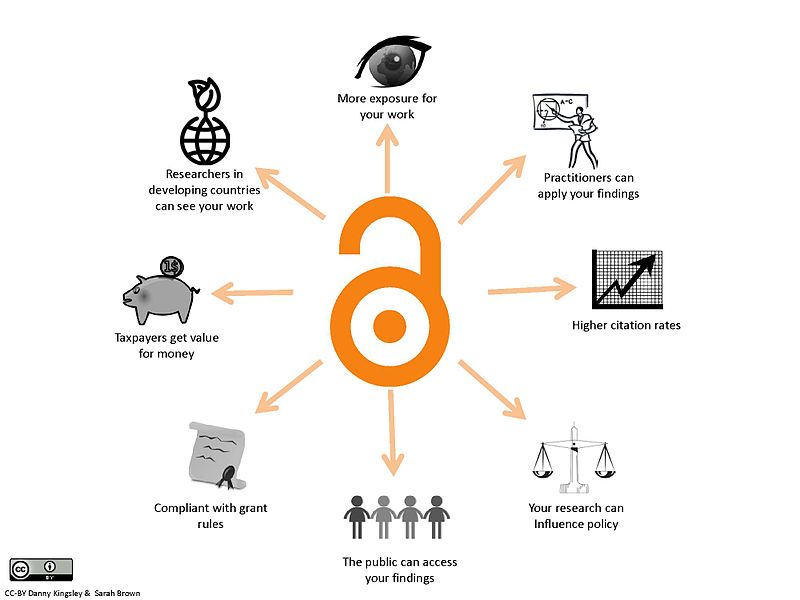Benefits and challenges of open science
Open science is a present-day way of working. The strength is working together, while the challenge is to balance between conducting research as openly as possible but in a responsible manner.
Watch this short introduction on how open science benefits you, the academic community and the society (CC BY SHB Online):
Practicing open science is good for…
…Research
Practicing open science means that research outputs are accessible to all – not stuck behind paywalls. This helps to ensure that all researchers, and other stakeholders, have access to information regardless of their location or economic situation. It means that the research process can be accelerated and new knowledge can be more quickly generated and built upon to help solve grand challenges.
…Society
Open science offers a better return on investment from research funded by public money and contributes to better economic growth.
…You!
Making your research outputs findable, accessible, interoperable and reusable (FAIR, more information about the FAIR principles in Making it FAIR) does require some additional effort on your part but practicing open science benefits you too.
For a researcher, opening the research outputs (e.g., research data) is a scientific merit. In Finland, e.g., in the CV templates of the Research Council of Finland and the Finnish National Board on Research Integrity, promoting open science and research and, for example, responsible distribution and reuse of research material and datasets count as scientific and societal impact in research work, and are, therefore, worth adding to your CV.
By sharing your articles, data, code and methods, you are even multiplying the number of citable outputs for every project you work on. Your research will be more visible and understandable to others, which may mean that you might see your citation rate increase. If people can find and access your research, the potential impact of your research increases. In addition, practicing open science can foster new collaborations and research partnerships. All of which can help you to advance in your career.
So, there are many benefits of open science both for you and for the society (Fig. 5).

Also read an article by McKiernan et al. (2016) to find out how open science helps researchers succeed.
Potential challenges of open science
The rationale for open science is clear but there are still concerns and issues to be tackled. The six challenges with open science in its various dimensions are:
Challenge 1 - Socio-cultural:
The lack of awareness of the benefits and importance of opening up research. The reluctance to change current workflows and practices, e.g., to share data along the research process. Researchers consider this a time and effort-consuming activity to add to their existing workloads. The lack of a clear recognition and a reward system that promotes open science practices. In addition to researchers and research institutions, there is also a change to be made on the part of the research funders, government bodies and other stakeholders.
Challenge 2 – Technological:
Information and communication technologies have rapidly improved but there is still work to be done to support and ease researchers’ workflows towards more open practices.
Challenge 3 – Political:
There is a clear need for political commitment to promote open science and integrate it into the government agendas, also at the international level. The necessary resources need to be allocated in order for these policies to succeed. Commitment for policy development and strategic planning are needed both at the research institution and country level.
Challenge 4 – Organisational:
The working environment (e.g. university, research institution) can have a significant impact on how quickly and broadly research becomes open. A closed culture is a challenge for individual researchers and slows down the overall openness of research. Organisations need to develop and acquire the appropriate skills to support open science within their organisation.
Consider: How your own research organisation has adopted open science? Does it have open access repositories, services and policies for supporting open science?
Challenge 5 – Economic:
Even if one of the main arguments for open science is a higher efficiency of research that in the long term will result in a better use of resources and acceleration of innovations, significant investments have to be made at the beginning in order to develop the technical, political and organisational ecosystem for open science.
Challenge 6 – Legal:
Open science changes the way we look at ownership of data, copyright, privacy and accountability in research. Many of these changes need to be reflected in legislation and research guidelines. A clear legislation framework must be developed at the international level and researchers must be aware of this legislation.
In addition to the above mentioned challenges, researchers may face many individual level challenges, such as:
- Financial and career challenges with author processing charges (APCs) for gold and hybrid open access publishing (OA fees will be more discussed in Choosing a suitable option). Also, currently limited research merit gained through data sharing.
- Motivation issues: Why engage in open science when structures and personal opportunities for merit and career advancement may reward the traditional way of doing research?
These adversities have the potential to slow down the processes of open science. Solutions can be found by collaborating, having potential will and aligning funding with key principles.
Which of these could motivate you to create more open research practices?
- More equal and democratic access to knowledge.
- More efficient use of scientific information and greater opportunity for innovation.
- Greater collaboration and opportunity for discovery.
- Improved engagement with society and citizens.
- Increased ability to resolve complex problems.
To sum up, let’s recapitulate the main benefits of open science for researchers, institutions, funders and the public. This short video describes the benefits of open science (CC BY FOSTER Open Science):
(8/2024 KH)
Move to the next page “Different ways to make your research more open“